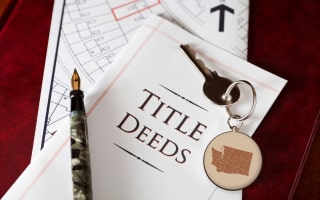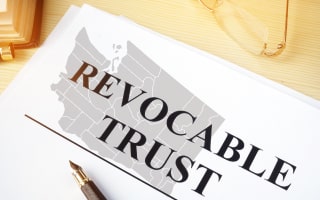How to Find Owners of Properties
in Washington

Property ownership in Washington is regulated by Title 64 of the Revised Code of Washington. There are a total of 22 chapters in Title 64, which include sections on conveyances, real property transfers, and joint tenancies.
You'll need to navigate to Chapter 65 of Title 65 to learn more about property tax records in Washington. These laws state that every real estate conveyance must be recorded at the county auditor's office. The public must also have access to these records.
The most common types of ownership in Washington are sole ownership, joint tenancy, community property, and tenancy in common. If you're interested in researching a property, there are many things you can do to access ownership records in the state. However, determining ownership in situations where the property is held by an LLC or trust might be more complicated.
How Do You Find Owners of a Property in Washington?

When you're searching for a property owner, there are several methods you can use to find them. For example, you can access third-party online resources to obtain property records. You can also search public records, which may be available online depending on the county.
Registry of Deeds
A registry of deeds is a comprehensive database where all real estate and ownership documents are recorded. Each county in Washington has a registry of deeds office. This database will give you access to real estate contracts, property taxes, mortgage information, and lien details for any property in the county.
To search for a specific property, you may need to know the parcel number or address. Many of the counties in Washington offer online access to the registry of deeds, some of which are linked below:
- King County
- Pierce County
- Snohomish County
- Spokane County
- Clark County
- Thurston County
- Kitsap County
Land Records Website
When a property is sold, a land record is created. These records are often produced when a piece of land is first transferred to a buyer from the government. Once land is recorded, any future sales produce deed documents.
Every county offers these records online. You can also learn how to access property tax records online in Washington on the Washington Secretary of State website. Make sure you have the parcel number and property address before performing this search.
City or Town Assessor's Office
Your local assessor should hold many different Washington real estate records, which include property records and tax documents. If the owner has claimed any exemptions in recent years, you can find this information at the assessor's office. Visit the assessor's office to claim a copy of property ownership records. Use the links below to learn more about the assessor office in your county:
- King County
- Pierce County
- Snohomish County
- Spokane County
- Clark County
- Thurston County
- Kitsap County
- Yakima County
- Whatcom County
- Benton County
Tax Records
Property tax records are also kept and maintained by your local assessor. If you're able to access tax records, you'll find the property's tax history, current ownership, and assessed values. You can request these records from your local tax assessor's website. You can also visit their office in person to ask for these records.
Title Company/Agency
A title company is a type of firm that provides title search services. These companies have large databases that contain property records. Their services are often requested by lenders and buyers who want to identify if there are any liens on the property. Performing a title search should give you access to a detailed ownership history. This service can cost as much as $250 in Washington.
Some of the other means you can use to find the owner of a property include asking the neighbors, browsing real estate websites, and hiring local professionals. A local real estate agent or lawyer should be able to access the types of documents you're looking for.
![]() Commercial Services
Commercial Services
Third-party real estate websites offer property ownership details. However, these records might not be as comprehensive as the ones that are available in your county. Consider using PropertyChecker.com if you'd like to search for statewide records with a third-party website. Their database includes information for more than 155 million properties in the country.
Once you enter this website, input the property address or parcel ID. You can also use the owner's email address or phone number if you have it. Once you enter the necessary information, you'll receive the following documents and records:
- Transaction History
- Foreclosure information
- Building permit details
- Property values, such as the market value
- Property details, which include the lot size, square footage, and year built
- Owner names
- Tax records
- Lien records
- Loan information
- Neighborhood data, including crime statistics
- Deeds
What Are the Different Types of Property Ownership in Washington?

Property ownership in Washington isn't relegated to one person purchasing a home and registering it under their name. Real estate can be purchased by companies, LLCs, and other entities. Understanding the many types of property ownership is essential if you want to make a more informed decision on buying a home.
The ideal ownership structure can influence everything from your finance options to the amount of taxes you pay every year. There are numerous property ownership types in Washington, each of which has different benefits and financial implications. The most common ownership types include joint tenancy, sole ownership, and tenancy in common. Here's a detailed look at the various ownership types available to you:
-
Sole Ownership: Only one person owns the rights to a home. Full control over the property legacy and decisions. Liable for annual property taxes and debts related to the property.
-
Joint Tenancy: At least two people have equal shares in a property, including right of survivorship. Transfer of the property can occur after death without going through probate. The joint tenancy ends if an owner sells their interest.
-
Tenants by Entirety: Married couples often use this type of joint tenancy. Offers survivorship rights and ample protection from creditors. Decisions about the property must be agreed upon by both parties.
-
Community Property: The property is purchased by both spouses during the marriage, which means that it's equally owned. Spouses must agree on how to manage, sell, or use the property. Home is equally divided following a divorce.
-
Tenancy in Common: Multiple owners have the same or unequal shares in a property. Shares can be inherited or sold independently. Owners might have disputes over the transfer and management of their homes.
-
Condominium Ownership: Many individuals own units in a larger complex. Access to numerous amenities and a personal living space. HOA fees might apply.
-
Cooperative Ownership: Residents have collective ownership of a property. Lowers purchase costs while also providing more control over the property. An owner must gain approval from other members to sell their shares.
-
Trust Ownership: The home is held in a trust for one or more beneficiaries. Asset protection from creditors and tax benefits are available. Managing and transferring the property can be difficult.
-
Life Estate: Ownership of this property lasts until the person dies, after which it passes to someone else. The owner has the right to benefit from the property while they are alive. Transferring or selling the home requires approval by a remainderman.
Finding the Owner of a Trust or Corporation that Owns Properties in Washington

The most common type of ownership in Washington is an individual purchasing real estate. However, property can also be held by a trust, limited liability company, partnership, or corporation. If you need to identify the owner of a corporation or trust that owns real estate in Washington, consider hiring a real estate attorney or title company.
You can also look for these records on your own. However, this process may require multiple steps. One option involves using business research tools like Westlaw and LexisNexis. You can also cross-reference public records that are available through the assessor's office. These records include deeds and property tax documents. Some of this info may be available at your local chamber of commerce. They usually have local business directories that you can look through.
Finding the Owner of a Trust in Washington
While the name of a trust's owner can be difficult to find in Washington, the website for the Washington Secretary of State includes a charity/fundraiser/trust search. If you know the name of the trust, you may be able to obtain ownership info.
Finding the Owner of an LLC in Washington
To locate the owner of an LLC in Washington, you must visit the Secretary of State's website. When searching for a corporation, you can enter the name of the business or its unified business identifier (UBI). The UBI is a nine-digit number that should give you immediate access to the records you're searching for. An advanced search is available that allows you to use many additional parameters when looking for a specific company.
Finding the Owner of a Corporation in Washington
To find the person who owns a corporation in Washington, follow the same steps as the LLC search. The Washington Secretary of State provides a business entity search tool that allows the public to look for companies and obtain their most recent records. The information should include the owner's name.
Common Methods of Property Transfer in Washington

A property deed is a legal document that effectively outlines how a property is being transferred. This document is drafted by the existing owner. If there are any liens or encumbrances on the property that have yet to be paid, they will be listed in the deed. While you can use many types of deeds in Washington, the most common ones are detailed below.
-
Quitclaim Deed: A quitclaim deed is designed to release the current owner's interest in the property without providing any warranties or stating the new owner's rights.
It doesn't guarantee that the current owner has an interest in the property. It does, however, prevent this person from eventually claiming that they hold an interest in it. These deeds are regularly used to transfer homes in non-sale scenarios. For example, you can use a quitclaim deed when gifting a home to a family member.
-
Bargain and Sale Deed: This type of deed doesn't guarantee that there are no liens or encumbrances on the property. If any title issues arise, the buyer will be responsible for them. While bargain and sale deeds can be used for many situations, they are most commonly drafted in tax or foreclosure sales.
-
Warranty Deed: A warranty deed is a type of legal document that provides the buyer with ample protection. It usually discloses every known encumbrance, which might include liens and easements. When preparing this deed, you must guarantee to the buyer that there are no outstanding title problems and that you have the right to sell the property to the purchaser.
Step-by-Step Guide to Property Transfer in Washington

If you're about to sell your home or transfer the title, you'll want to review the legal and administrative actions that must occur during this process. To officially transfer property ownership in Washington, you must begin by identifying the type of deed you're going to use. The types of documents you need to gather depend on the deed you're using.
When drafting a general warranty deed, research the property's ownership history to determine if any issue might arise in the future that you'll be liable for. Once you identify the deed that best matches your situation, perform a title search. This search allows you to identify any outstanding liens that need to be paid off before you can transfer the property. A title search in Washington can cost anywhere from $100-$250. You'll also need to buy title insurance.
The deed will then be prepared. This document includes some of the details about the transfer, such as a legal description of the property and the names of the buyer and seller. Both parties must sign this document in front of a notary public. Once the deed has been prepared, transfer taxes must be paid. Depending on the value of the property that's being transferred, your taxes can range from $1.10 to $3.00 per $100 of the sale price.
After paying the necessary taxes, the deed will be reviewed and recorded. You'll also receive a receipt of the deed. It's a good idea to update records after a property transfer takes place. For example, make sure you visit your local assessor's office to verify that future tax bills will be sent to the new owner.
Property Ownership Guide
- How to Find Owners of Properties in Washington
- How Do You Find Owners of a Property in Washington?
- What Are the Different Types of Property Ownership in Washington?
- Finding the Owner of a Trust or Corporation that Owns Properties in Washington
- Common Methods of Property Transfer in Washington
- Step-by-Step Guide to Property Transfer in Washington
Washington Homeowner Lookup
- Owner(s)
- Deed Records
- Loans & Liens
- Values
- Taxes
- Building Permits
- Purchase History
- Property Details
- And More!
Property Ownership Guide
- How to Find Owners of Properties in Washington
- How Do You Find Owners of a Property in Washington?
- What Are the Different Types of Property Ownership in Washington?
- Finding the Owner of a Trust or Corporation that Owns Properties in Washington
- Common Methods of Property Transfer in Washington
- Step-by-Step Guide to Property Transfer in Washington